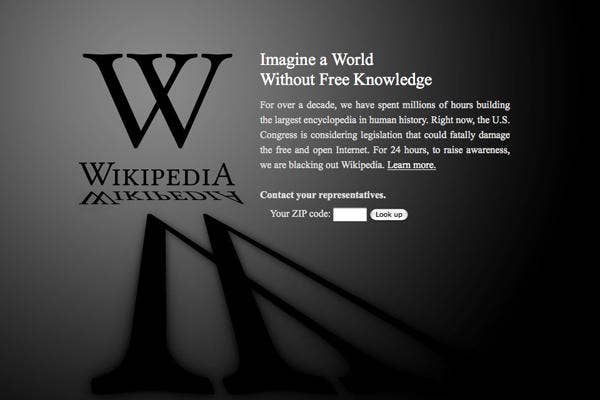
On January 18th, the long-simmering online debate about two Congressional bills — Stop Online Piracy Act (SOPA) and its sister, PIPA — boiled over into actual protests across the country as well as a blackout of several sites like Reddit and Wikipedia. Silicon Valley rose against Hollywood as Mozilla, Google and other companies successfully stopped the two bills, which opponents argued would have protected copyright at the expense of free expression.
For awhile, though, it was unclear what the industry's next move was going to be. But today, a group called Free Press released a five-point statement, "The Internet Declaration of Freedom," that's been endorsed by Electronic Freedom Foundation, the Cheezburger network, the Harry Potter Alliance and more than 60 groups and individuals.

According to Josh Levy, the head of internet campaigns for Free Press, the drafting of this statement took place over many emails, face-to-face meetings and late-night work on shared Google docs over the course of this spring. Dozens of contributors weighed in, such as Ben Huh of Cheezburger networks, researcher Danah Boyd, Derek Slater of Google, Stanford's Elizabeth Stark and more.
The five principles are purposely vague, says Levy, and are not to be used as policy recommendations. The group effort was designed to put out a positive statement rather than just formulating reactions to perceived intrusions on the open web. Levy's goal is to get people talking about these five notions over the next few months: in addition to releasing it on Reddit and other online communities, Free Press will be organizing meet-ups.
Obviously, regulating the internet poses significant challenges, no matter where one stands on the need to curb piracy and protect copyright vs. allowing pure, uninhibited expression. Google, Facebook and other online behemoths already exert considerable resources on lobbying efforts, in the U.S. and abroad: President Obama spends a lot of time dining with donors in San Francisco. Microsoft, who gave almost nothing to politicians before 1998, is now a leading political fundraiser— they've already contributed around $387,000 the president's campaign this past year, according to Open Secrets. And with so many different industries in transition, it's not just overarching piracy-related bills that tech companies want to influence. When Netflix formed its own PAC earlier this year, GigaOm postulated that it wasn't a reaction to SOPA as much as opposition to VPPA, the Video Protection Privacy Act, a 1988 law designed to keep video rental records private. (That's right: they want to decrease privacy.)
Levy acknowledged the uptick in lobbying efforts from big tech but said that this declaration wasn't really about the bigger political shifts as much as opening up the discussion. What happens after the discussion seems fuzzy; the SOPA protest worked because it was something tangible to rally against. It's hard to imagine meet-ups about general concepts of "internet freedom" brimming with the same kind of fiery, movement-building enthusiasm.
Already, though, commenters on Reddit have brought up the issue of anonymity. "The idea here is is phase one, the release of a document," he said, "But now, the next phase is to get public feedback, so that people can remix, edit, what internet freedom means."
